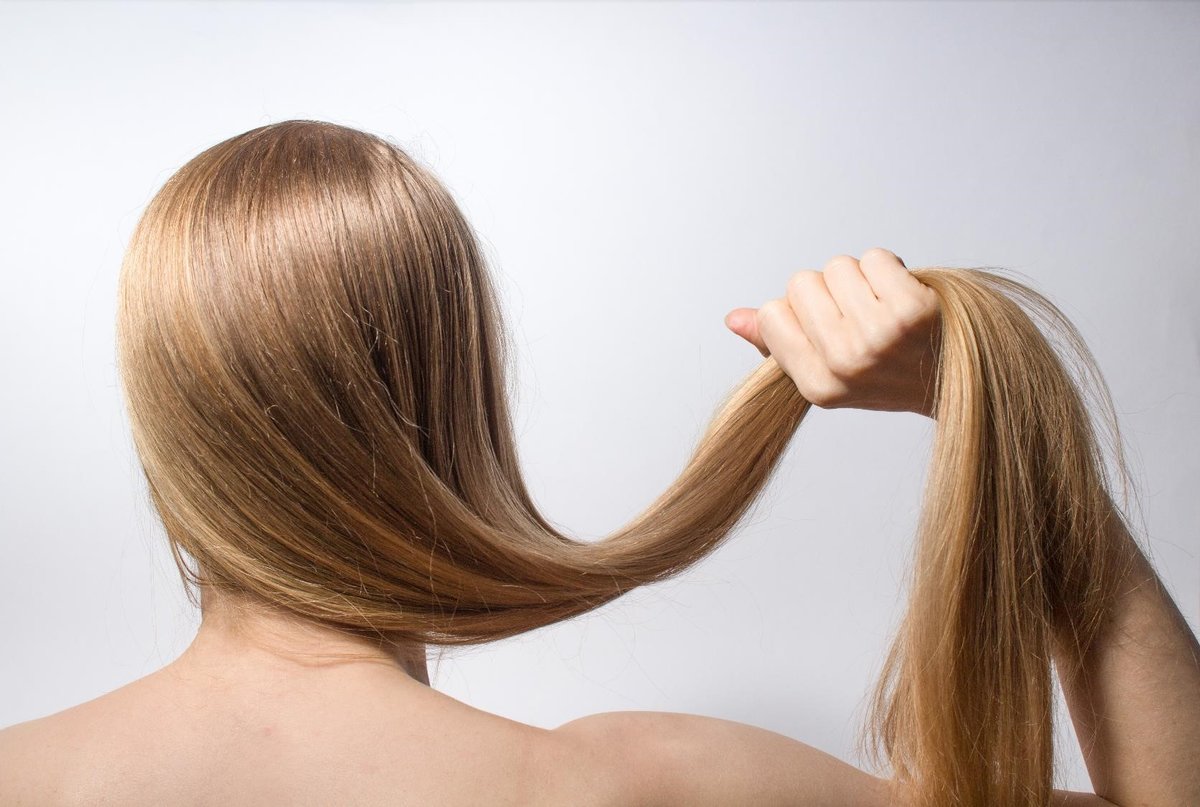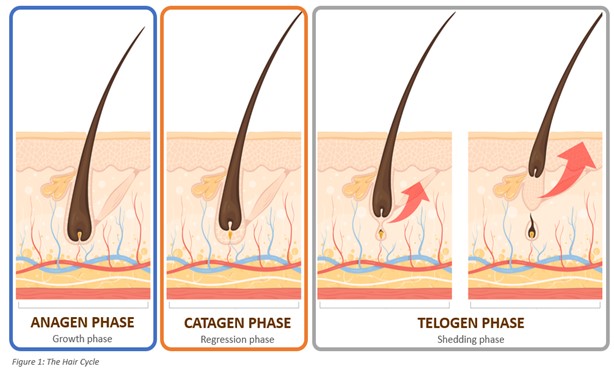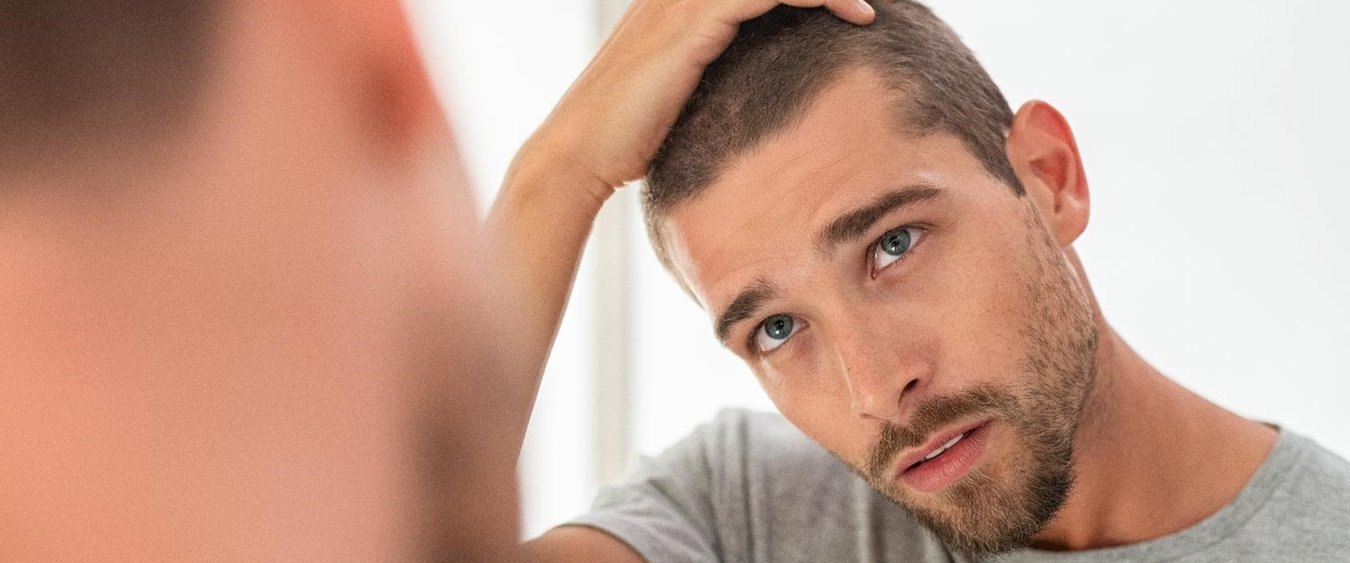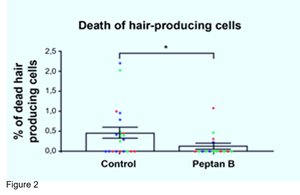Why hair growth supplements are a major market opportunity

On the nutricosmetics market, more consumers than ever are looking for solutions to promote hair beauty from within. The hair beauty from within market is predicted to grow at a Compound Annual Growth Rate (CAGR) of 10% between 2021 and 2025(3). Within this market, one segment offers an especially exciting opportunity for manufacturers: hair loss supplements.
20% of people are concerned about thinning hair”
Euromonitor (2021)
While aging is often one factor in hair loss, the issue affects more than just the elderly. Consumers of many backgrounds and ages are worried about hair loss:
- Mature women (babyboomers): as women age, lower levels of estrogen can lead to thinning, temporary hair shedding, and permanent hair loss(4)
- New mothers: hormonal shifts during pregnancy can cause excessive hair loss(5)
- Millennial and Gen X men: the majority of men face some progressive hair loss and pattern baldness over their lifetime(6)
The science behind hair loss
Our hair follows a four-phase growth cycle, as shown in Figure 1 below.

As each hair cell goes through the cycle, hair-producing cells, known as keratinocytes, stay active, promoting the growth of new hair cells. This means that, as each hair reaches the shedding phase, it can be replaced by a newly formed, growing hair – ensuring a full, healthy head of hair. However, if hair cells reach the catagen, or regression, phase too early, hair loss and thinning can take place.
Peptan collagen peptides could influence hair loss, new study shows
In a recent scientific study performed in collaboration with Monasterium Laboratories**, a world-leading Contract Research Organization (CRO) in skin and hair research, researchers investigated the impact of Peptan collagen peptides on hair loss(7). During the study, the researchers treated human hair follicles from both male and female volunteers, with an average of 51 and 39 respectively. The collagen peptides used were digested in vitro, mimicking the process of digestion after oral intake, to ensure similar conditions to real-life physiology.
Both of these aspects make the results highly relevant to consumers.
The findings were clear: supplementing with Peptan inhibits the death of hair-producing cells, as seen in Figure 2, which keeps the follicle younger.
These results suggest that Peptan collagen peptides can slow down hair loss in both men and women.
Peptan: a science-backed option for sustainable, clean, and minimalistic hair growth supplements

The results of the study present Peptan collagen peptides as a viable option for manufacturers looking to meet the growing number of hair care supplement consumers. Another clinical study indicates Peptan can improve hair strength, while 67% of participants in a consumer survey reported an improvement in hair quality after daily oral supplementation for three months. Peptan’s formulation and application advantages, meanwhile, can help health and nutrition players tap into the kind of solutions consumers are looking for today, with sustainable, clean, and minimalistic products founded upon a clean-label, traceable, and revalorized ingredient.
Discover Peptan’s potential for the growing hair care market here
**About Monasterium Labs
Monasterium Laboratory brings together a network of international advisors, scientists, dermatologists, and consultants, merging knowledge from academia and the beauty industry. Their client list includes some of the leading companies in the field of skin and hair care. They provide high-quality research for different applications, as indicated by their strong publication record in international journals, with over 170 publications in the last 7 years.
[1] Innova Market Insights (Beauty and Personal Care Survey 2020). *Global: average of respondents from Australia, Brazil, China, France, Germany, Italy, Japan, Spain, United Kingdom, and United States.
[2] Euromonitor Voice of the Consumer: Beauty Survey, 2021
[3] Nutricosmetics Market Analysis and Segment Forecasts To 2025 + RH&N.
[4] Grymowicz, M. et al. (2020). Hormonal Effects on Hair Follicles. Int. J. Mol. - Sci. 2020, 21, 5342. - Healthline: Menopause Hair Loss Prevention 2019.
[5] Grymowicz, M. et al. (2020). Hormonal Effects on Hair Follicles. Int. J. Mol. - American Academy of Dermatology Association.
[6] American Academy of Dermatology Association.
[7] Rousselot & Monasterium Lab (manuscript in preparation, 2022).
DISCLAIMER:
Rousselot makes no representation or warranty, whether expressed or implied, as to the accuracy, reliability, or completeness of the information, nor does it assume any legal liability, whether direct or indirect, for any information. Use of this information shall be at your discretion and risk. Nothing herein relieves you from carrying out your own suitability determinations and tests and from your obligation to comply with all applicable laws and regulations and to observe all third-party rights. This product is not intended to diagnose, treat, cure, or prevent any disease.

